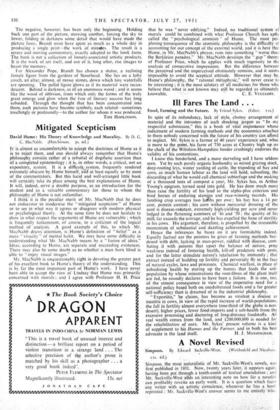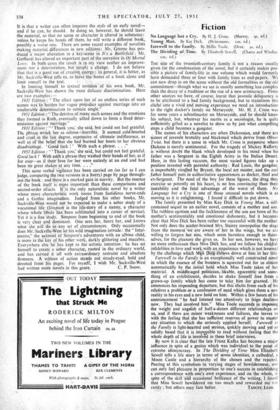A Novel Revised .
Simpson. By Edward Sackvidle-West. (Weidenfeld and Nicolson.
121. 6d.)
Simpson, the most naturalistic of Mr. Sackville-Wesrs_ novels, was first published in 1931. Now, twenty years later,' it appears again. having been put through a tooth-comb of textual emendation ; and Mr.' Sackville-West gads an interesting note on how far a novelist can profitably rewrite an early work. It is a question which faces any writer with an artistic conscience, whenever he has a book reprinted ; Mr. Sackville-West's answer seems to me entirely wise. It is that a writer can often improve the style of an early novel— and if he can, he should. In doing so, however, he should leave the material, so that no scene or character is altered in substance: unless he keeps his hands off them, he will write a different book, possibly a worse one. There are some recent examples of novelists making material d.ifferences in new editions: Mr. Greene has pro- duced a major alteration in a -key-scene in It's a Battlefield ; Mr. Gerhardi has altered an important part of the narrative lit Of Mortal Love. In both cases the result is, in my view neither in improve- ment nor a deterioration, but simply a change. I do not believe that that is a good use of creative energy : in general, it is better, as Mr. Sackville-West tells Us, to leave the bones of a book atone and
limit oneself to the text .
In limiting himself to textual revision of his own book; Mr. Sackville-West has shown the most delicate discrimination. Here are two examples:-
1931' Edition; The effect upon her of an endless series of such scenes was:fp harden her vague prejudice against marriage into an unalterable determination to remain single."
1951 Edition The detritus of many such scenes and the emotions they folioed in Ruth, eventually sifted down to form a fixed deter- mination against marriage."
1931 -Edition : 'k Thank you,' she said, but could not feel grateful. The phrase struck her as odious=horrible. It seemed cold-hearted and cruel in the last degree, expressive of ultimate indifference, as well as of the belief that she had burned her boats to her obvious disadvantage. 'Good luck ! ' With such a phrase. . . ."
1951Edition : "'Thank you,' she said, but could not feel grateful. Good luck ! With Pith a phrase they washed their hands of her, as if for ever—as if their:love for her were entirely at an end and had been no great shakes at any time. . . ."
This same verbal vigilance has been carried on (so far as I can judge, comparing the two versions in a hurry) page by page through- out the book: and there is a marked gamin suavity. But the essence of the- book itself is more important than these comparisons and second-order effects. It isthe only naturalistic novel by a writer whose more -characteristic work issues from, fastidious nerve-ends and a Gothic imagination. Judged from his other books, Mr. Sackvdle-West Would not be expected to make a sober study of a vocational life '(Simpson is the life-story of a nanny, a character whose -whole' libido has been sublimated into a career of service). Yet it is a fine 'study. Simpson from beginning to end of the' book is very clear and dominant. One sees her, hears her, and knows what she will :do in-any set of circumstances. Only occasionally does Mr..Sackville-West let his wild imagination intrude: the "Inter- mezzo," the account of Simpson's adventures with an albino child, is more in the key of his other work, darkly glittering. and macabre. Everywhere else he has kept to his-artistic intention: he has set himself to create a sober character, rooted in -the ordinary world, and has carried it off with' extraordinary restraint and absolute firmness. A woman of action stands out steady-eyed, bold and devoted from .bis pages: For myself, I wish Mr. Sackville-West had written more novels in this genre. C. P. SNOW.



































 Previous page
Previous page